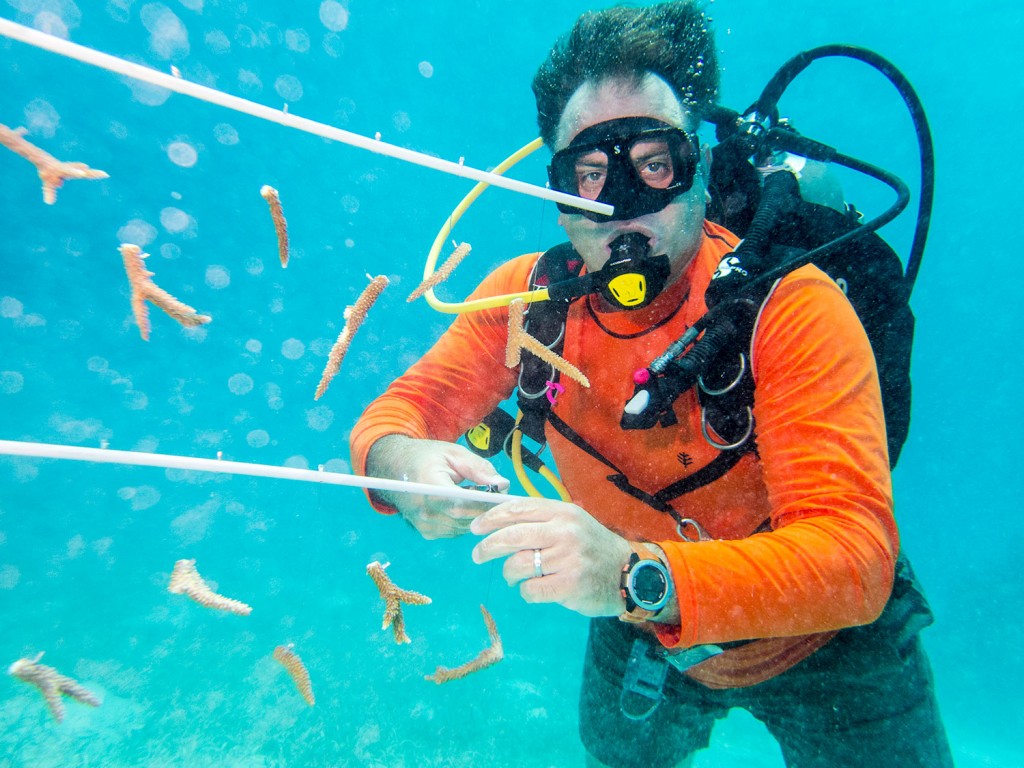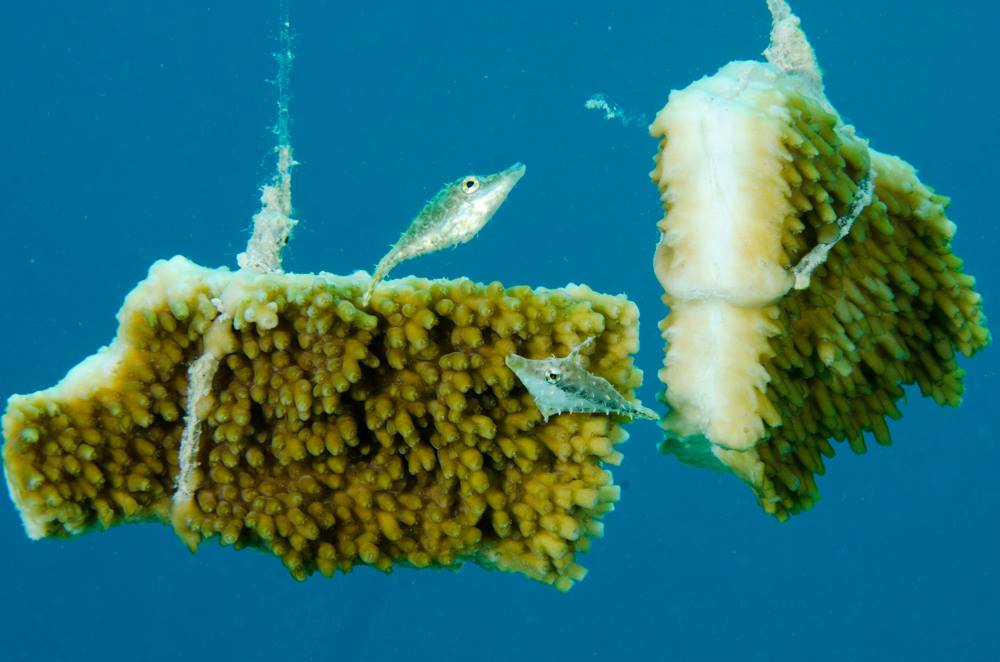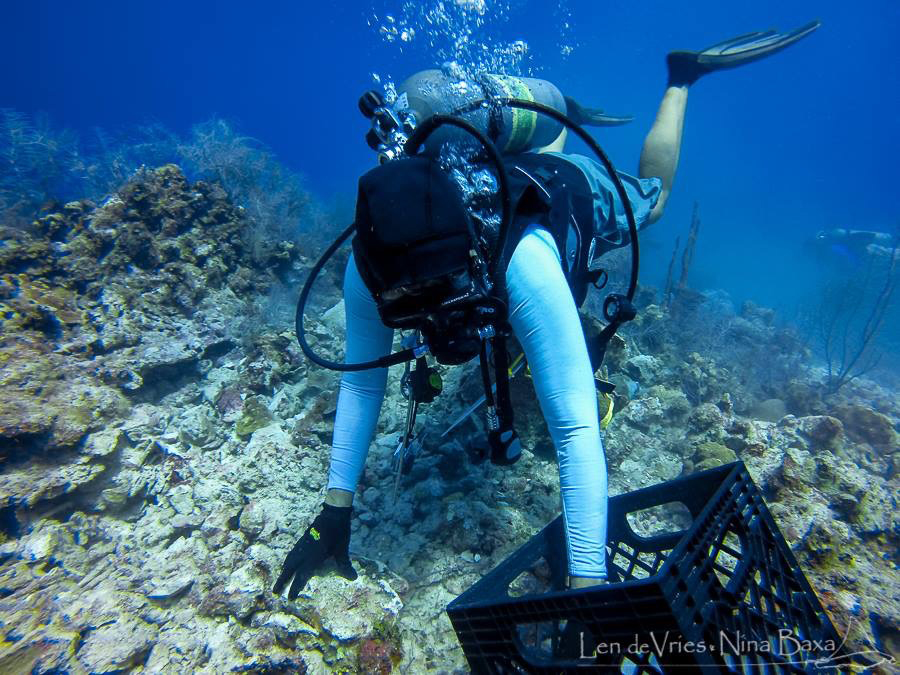Marine Life & Conservation
Ocean Frontiers: 20 Years of Conservation on Grand Cayman’s Pristine East End
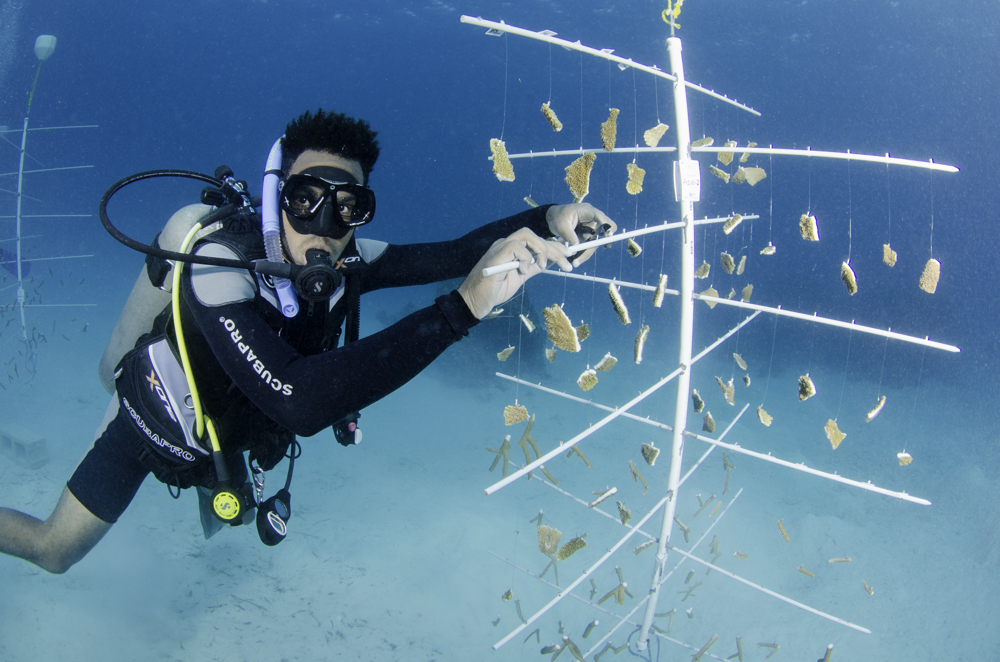
Ocean Frontiers has a proud history focused on ocean conservation, highlighted by the establishment of Grand Cayman’s first and largest coral nursery
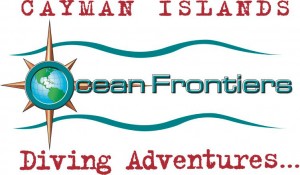 Ocean Frontiers, located at the Compass Point Dive Resort in Grand Cayman’s East End, is celebrating its 20th Anniversary as a dive operator this year. Co-owner Steve Broadbelt says there is no better way to mark the occasion than to announce the establishment of their long-anticipated coral nursery, a valuable tool for replenishing reefs at East End. Ocean Frontiers has a long history of conservation and environmental projects, and when the Cayman Islands Department of Environment called for proposals, Broadbelt submitted an ambitious plan. The timing was perfect because the coral trees were planted as the world celebrated Earth Day.
Ocean Frontiers, located at the Compass Point Dive Resort in Grand Cayman’s East End, is celebrating its 20th Anniversary as a dive operator this year. Co-owner Steve Broadbelt says there is no better way to mark the occasion than to announce the establishment of their long-anticipated coral nursery, a valuable tool for replenishing reefs at East End. Ocean Frontiers has a long history of conservation and environmental projects, and when the Cayman Islands Department of Environment called for proposals, Broadbelt submitted an ambitious plan. The timing was perfect because the coral trees were planted as the world celebrated Earth Day.
“We were thrilled to announce the installation of Grand Cayman’s biggest coral nursery during Earth Day celebrations because our project has been in the planning process for more than a year. To announce it at a time when we focus on the environment made the occasion even more memorable,” said Mr. Broadbelt. “The goal of our coral nursery is to grow coral fragments of the endangered Staghorn and Elkhorn corals and then out-plant the corals to designated reefs that have shown signs of coral loss or damage.”
With a coral restoration program in mind, Broadbelt brought Lois Hatcher on board a few years ago. With considerable experience and training in coral restoration, plus the passion to see it through, Hatcher was the perfect choice to manage it.
“I’m elated that it has finally happened!” says Ms. Hatcher. “The site is five minutes from the dock and I personally will go out whenever I can. I’m training most of the Ocean Frontiers staff on how to maintain the nursery. It is very much my baby, and I’m anxious about it working, like a mother hen fussing over her chicks.”
Broadbelt, Hatcher, and others, including two Caymanian students, spent the spring months doing prep work to set up its nursery. The work involved selecting strong donor coral colonies and monitoring them for potential problems – the goal is to install strong corals in the nursery to increase chances of survival. Materials needed to build the trees had to be collected, and structures assembled. Broadbelt himself installed all the anchors for the trees.
“The hope is that by out-planting the strong fingerlings grown in our coral nursery they’ll have a better chance of becoming established on the reef,” said Ms. Hatcher. “So far so good. We will be doing weekly maintenance on the site and reporting to the Department of Environment. The fragments will be monitored for disease, photographed and measured. They already show visible growth after only two weeks.
And the coral fragments are already attracting marine life. Ocean Frontiers is starting with 10 coral trees but expanding to 60 in time. Managing the largest coral nursery in Grand Cayman reflects Ocean Frontiers’ commitment to being a good steward of Cayman’s marine environment, from the first day it opened for business in February 1996. Broadbelt and co-owner Maurice “Mo” Fitzgerald always observe and promote ocean conservation, garnering recognition through the years.
Eco Milestones for Ocean Frontiers and Compass Point Resort
- Green Globe Certification for Compass Point in 2010
- Project AWARE’s Environmental Achievement Award in 2004 and 2010
- Governor’s Environmental Award for Tourism in 2014 for Compass Point
- PADI Green Star Dive Center Award for Ocean Frontiers
- Green Leader Recognition by TripAdvisor travel dive site
Current Ocean Frontiers Conservation Projects
- Invasive Lionfish Culling
- Coral Bleaching Monitoring & Temperature Data Collection Project
- Turtle Release Program Sponsor
- Teens4Oceans & Ocean Classrooms Sponsor
- Cayman Sea Sense – Shark Conservation and Tagging Project
- Green Shorts Challenge – program aimed at distributing diver load evenly at East End
- Coral Spawning – Ongoing documentation and data collection on annual event
“Before we began operating the great dive sites of East End were largely unavailable to divers staying in the Seven Mile Beach area, so we saw an opportunity to attract people by offering a free shuttle to our dive site. Demand skyrocketed and Ocean Frontiers launched into its successful first year.”
The founders focused on customer service and the industry’s leading edge. Ocean Frontiers was among the first Cayman operators to use nitrox. Because of a busy dive schedule, nitrox was introduced as a safety measure for dive staff. With time, Nitrox was accepted industry-wide, and customer demand went up. Ocean Frontiers became one of the few dive operations on Grand Cayman that offered Nitrox to customers. Customer satisfaction led to Ocean Frontiers being voted ‘World’s Best Dive Operator’ by the readers of Rodale’s Scuba Diving Magazine in their 1998 Readers’ Choice Awards.
“This was significant and it boosted our reputation and attracted more business to Ocean Frontiers,” said Steve Broadbelt.
Other milestones in the company’s growth:
- Grand Opening: A new state of the art dive facility with boat dock, retail shop, dive school and training pool, opened in 2000 not far from the original site where Ocean Frontiers began doing business in 1996. This introduced a new standard in luxury for divers and was a strong departure from dive shacks around East End that divers had been accustomed to.
- Shark Diving Program: In 2001 Ocean Frontiers introduced Cayman’s first and only Shark diving program with a classroom session on shark biology and conservation and a dive where divers experience as many as 8 to 16 Reef sharks up close. At the same time research was conducted with science partners such as the Guy Harvey Research Institute and Mote Marine Laboratory, but despite an immaculate safety record and a well-run program, the local government decided to ban shark diving in Cayman.
- Coral Spawning Dive: In 2002, Dr. Alex Mustard and Steve Broadbelt successfully observed and documented the annual coral spawning for the first time on record in the Cayman Islands. For the last 13 years Ocean Frontiers has been sharing this discovery and formula for calculating the spawning events every September and bringing this rare event in to the eyes of anyone that can dive and is not afraid of the dark.
- Public Moorings: Ocean Frontiers has helped the Cayman Islands Department of Environment increase public moorings from 10 to 40+ to open pristine dive sites in the East End.
- Eagle Rays Bar & Grill: Much anticipated by customers and staff, the dockside bar & grill opened for business in 2013 offering lunch, dinner and bar service. Eagle Rays features themed nights during the week, such as a ‘Divers Night’ every Tuesday with an island buffet and dive movies and photos of the week.
“Looking back over the last 20 years, there has been a common theme to our success – what is good for the environment is good for our business,” says Steve Broadbelt. “We started out as a very small dive shop with one boat, very few staff and big dreams. Even though we have grown little by little, we will always be a ‘first name basis’ place that retains a personal touch with outstanding service. 20 years later the picture is complete as a dedicated dive resort offering ‘roll out of bed and on to the dive boat’ convenience.”
To find out more about ocean Frontiers, visit www.oceanfrontiers.com.
Marine Life & Conservation
Paul Watson Released as Denmark Blocks Japan’s Extradition Bid

Renowned anti-whaling activist Paul Watson has been released from custody in Greenland after spending five months in detention. Denmark’s Justice Ministry rejected Japan’s request for his extradition, citing insufficient guarantees that his time already served in custody would be credited against any potential sentence.
The 74-year-old Canadian-American was arrested on July 21 in Nuuk, Greenland’s capital, when his ship docked to refuel. His arrest was based on a 2012 Japanese warrant related to a 2010 encounter in Antarctic waters. Japan alleged Watson obstructed operations and caused damage to a whaling research ship during efforts to disrupt illegal whaling. Watson has consistently denied these claims, maintaining his commitment to marine conservation.
Denmark, which oversees extradition matters for Greenland, concluded that while the legal conditions for extradition were met, the lack of assurances from Japan regarding time-served credit made extradition untenable.
In a video shared by his foundation, Watson expressed gratitude and relief, saying, “After five months, it’s good to be out… and good to know they’re not sending me to Japan.” He added that the most difficult part of his time in custody was being separated from his two young sons.
Watson is a pioneering figure in marine conservation, known for founding the Captain Paul Watson Foundation in 2022 after decades of activism with the Sea Shepherd Conservation Society. His bold efforts to defend marine life have earned him widespread support, including from celebrities and conservationists. His work has also been featured in the acclaimed reality TV series Whale Wars.
Watson’s lawyer, Jonas Christoffersen, praised the decision, stating, “We are happy and relieved that Paul Watson is now free.” He added that Watson is eager to reunite with his family and continue his vital work.
The arrest occurred while Watson’s vessel, the M/Y John Paul DeJoria, was en route to the North Pacific with a team of 26 volunteers to intercept a Japanese whaling ship. His foundation described the arrest as politically motivated and emphasized that Watson’s actions were focused on ending illegal whaling practices.
Japan resumed commercial whaling in 2019 after leaving the International Whaling Commission, asserting that whale meat is a cultural tradition. Conservationists, however, continue to challenge these practices, highlighting their impact on marine ecosystems.
Despite the challenges, Watson remains steadfast in his mission to protect marine life and bring attention to whaling practices. His dedication to ocean conservation has made him a globally respected advocate for the environment.
Marine Life & Conservation
12 Days of Zero-Waste Fish-mas

This holiday period, the Marine Conservation Society, the UK’s leading ocean membership charity, invites you to make some simple changes to eating fish this Christmas to help our seas.
Dr Kenneth Bodles, Head of Fisheries and Aquaculture at the Marine Conservation Society, said, “During the festive season, our consumption increases, but so does waste. Sustainability isn’t just about where food comes from – it’s also about how you use it. By reducing waste and making the most out of your seafood, you’re not only taking steps to be more ocean-friendly, but can also help to cut costs during what is often one of the most expensive times of the year”.
The Marine Conservation Society has compiled twelve tips on how to consume seafood sustainably with zero-waste this Christmas:
Buy whole fish instead of fillets
Instead of fillets, consider buying whole fish such as salmon, hake, or lemon sole. By adopting a “nose to tail” approach with cooking, whole-baked fish not only feeds a crowd, but also helps to minimise waste and maximise sustainability by using up every part of the animal, including bones, skin, and fat.
Make fish stock
Leftover fish bones or shells can be put to good use by boiling them to make a nourishing fish stock or bisque. This can be frozen and preserved for later use and makes for a flavourful base in a soup.
Make your own fish pâté
Avoid waste by turning leftover fish, such as smoked mackerel or salmon, into a delicious pâté by blending with cream cheese and lemon. Perfect when paired with crackers.
The sustainability of salmon and mackerel varies depending on where and how it is caught or farmed. For more information on green-rated options, check the charity’s Good Fish Guide.
Buy frozen
By purchasing seafood that is frozen or vacuum-packed, this helps to reduce waste by extending the shelf life of your food.
Fish pie
If you’re wondering what to do with leftover cooked fish, why not opt for a classic fish pie with mashed potatoes, leeks, and a cheesy sauce? A sure crowd pleaser on Boxing Day.
Use the head
Don’t forget the fish head! The meat is incredibly tender and flavourful. The charity recommends a cod’s head curry or recreating Fallow’s renowned cod’s head in siracha butter.
By stretching your ingredients further, not only is this a more sustainable way to enjoy seafood, but also cost-effective by repurposing leftovers and cooking creatively.
Boxing Day brunch
Mix leftover kippers or smoked salmon with scrambled eggs for a tasty, zero-waste, Boxing Day brunch.
For best choice, make sure you buy kippers, or herring, from the North Sea and the North Irish Sea.
Zero-waste storage
A top tip from the Marine Conservation Society to avoid waste is freezing fish offcuts to save for future use.
Crisp up the skin
Even leftover fish skin can be turned into a quick savoury snack by crisping it up in an air fryer with a little olive oil and salt.
Anchovies two ways
Leftover anchovies can either be blended with butter to make a delicious anchovy butter or tossed into pasta for a hit of umami flavour.
The charity recommends opting for anchovies caught in the Bay of Biscay for best choice.
Fishcakes
For an easy, zero-waste meal, leftover seafood trimmings can be mixed with mash and fried in breadcrumbs to make fishcakes.
Pickled mussels
Try pickling mussels in 1:1 vinegar and water, with a dash of sugar for a sustainable, zero-waste snack that can be enjoyed well beyond the festive season.
Mussels farmed in the UK are a seafood superhero. Grown using low-impact methods and harvested by hand, they get all the food they need from the sea around them. This makes them one of the most sustainable, ocean-friendly, and cost-effective seafood options.
Players of People’s Postcode Lottery have raised £6.6M towards the Marine Conservation Society’s vital work in making seafood more sustainable.
Laura Chow, Head of Charities at People’s Postcode Lottery, said: “Fish is a festive favourite for many, but making sustainable choices when it comes to how we buy and eat seafood makes all the difference for our ocean. Support from players of People’s Postcode Lottery has helped the Marine Conservation Society further its sustainable seafood work, so that we can all enjoy healthier, better protected seas.”
The Marine Conservation Society encourages you to make sustainable seafood choices a year-round habit, not just for Christmas. To check how sustainable the seafood on your plate is, you can visit the charity’s Good Fish Guide. The Guide helps consumers and businesses identify the most sustainable seafood using a simple traffic light system, based on where and how species are caught or farmed. Green is the best choice, amber means improvements are needed, and red indicates fish to avoid buying.
Zero-waste gift idea
Why not embrace a zero-waste Christmas by gifting a membership to support marine conservation? It’s a meaningful, low-waste gift that helps protect our ocean for generations to come. Memberships start from as little as £5 a month – the price of a sandwich and drink from your local coffee shop.
Find the latest sustainable seafood advice for wild-caught and farmed seafood on the Good Fish Guide, downloadable to your phone from www.mcsuk.org/goodfishguide.
-

 News2 months ago
News2 months agoIconic SS United States to become the World’s Largest Artificial Reef
-

 News3 months ago
News3 months agoBook Review – 52 Assignments: Underwater Photography
-

 Gear News3 months ago
Gear News3 months agoDYNAMICNORD – New German diving brand enters the British market
-

 News3 months ago
News3 months agoExploring Cenote El Pit: A Diver’s Dream
-

 Gear News3 months ago
Gear News3 months agoTry BARE drysuits (and maybe even win one!) this Friday with Sea & Sea at North West Dive Fest
-

 Marine Life & Conservation3 months ago
Marine Life & Conservation3 months agoBook Review: Coral Triangle Cameos
-

 Blogs2 months ago
Blogs2 months agoDive the Egyptian Red Sea this Autumn with Regaldive
-

 News3 months ago
News3 months ago2024 Ocean Art Underwater Photo Competition Announced


